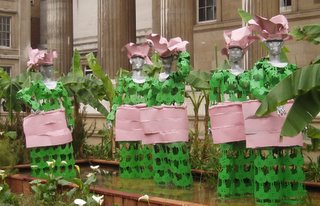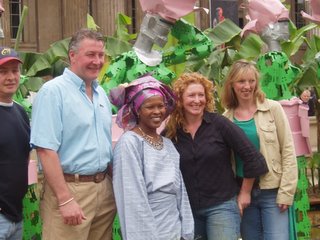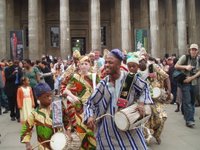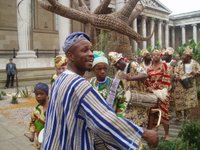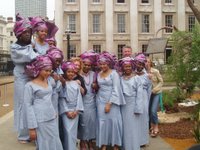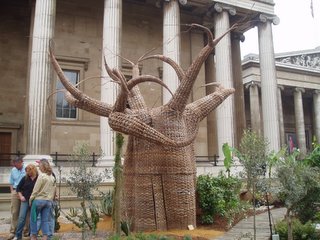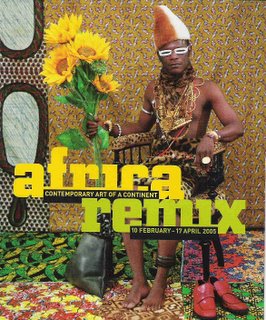*Nobel Laureate, Wole Soyinka read the following out at the Purcell Room, South Bank, London, last night - in rememberance of Ken Saro-Wiwa.....
FLIGHT FROM AUCKLAND - Nov 1995 I was due in Tokyo, Japan, but not for a number of days. I diverted to Auckland where the Commonwealth Heads of States were gathering for their biannual summit, and it was clear that they alone, at that stage, still commanded the weight of voices that might save nine innocent men from the gallows. My message was insistent, desperate and even strident: only strong threats will save these lives, strong threats backed by unmistakable indications that such threats will be enforced if the sentence is carried out! Occasionally, very exceptionally I encountered an adviser who listened and thought hard and deep, as if resolved to influence attitudes within his delegation or the routine caucuses. I then walked back into the sunlit streets, desperately plucking courage from such meagre signs.The day's brightness augured well, but beneath itcautioned the persistent voice of the life-battered character, Mama Put, from my play, ‘The Beatification of Area Boy’, which had just begun its run at the West Yorkshire Playhouse, Leeds, England. The coincidences were unnerving. Mama Put was a fugitive from the Delta region, the same embattled oil founts of Ken Saro-wiwa and the Ogoni people. As if strolling beside me, her voice continued to resound in my head, straight from the rehearsals:A sky such as this brings no good with it. The clouds have vanished from the sky but, where are they? In thehearts of those below. In the rafters. Over the hearth. Blighting the vegetable patch. Slinking through the orange grove. Rustling the plantain leaves and withering them – oh, I heard them again last night- and poisoning the fish ponds. When the gods mean to be kind to us, they draw up the gloom to themselves -yes, a cloud is a good sign, only, not many people know that. Even a wisp, a mere shred of cloud over my roof would bring me comfort, but not this stark, cruel brightness. It's not natural. It's a deceit.The Beatification of Area Boy was a play I had written long before Ken’s travails, indeed, it was to have commenced rehearsals in Nigeria a mere week or so before I was compelled to flee the country. Now Mama Put appeared to have taken on Ken Saro-wiwa’s voice from his dungeon. She was speaking of the Nigerian Civil War - one in which, again as it happened, Ken had played an important role. Like a night bird perched on my head, Mama Put continued to intone Ken’s indictment of his latest adversaries - the oil companies and their military collaborators in the Nigerian nation: Those who did this thing to us, those who turned our fields of garden eggs and prize tomatoes into mush,pulp and putrid flesh....After the massacre of our youth came the plague of oil rigs and the new death of farmland, shrines and fish sanctuaries, and the eternal flares that turn night into day and blanket the land with globules of soot....?"Jerked back into the present of Auckland masquerading as a clone of my hometown Abeokuta, my mind grasping greedily at distractions, I wondered, absurdly, if the successful preservation of the woodlands of New Zealand had anything to do with the prominent role ofNew Zealanders in the wave of ecological championing then sweeping across the globe. And sure enough, later that morning, I came upon a demonstration organised in denunciation of the British Prime Minister, John Major– expected at the conference - for his support of the French atomic explosion being carried out in the South Pacific islands, despite a near-unanimous condemnation by the world.The demonstration, I soon observed, was beamed at multiple targets. When the crowd came to an open space, it stopped, and a street drama began, utilising huge satirical masks. One of the themes dealt with the social injustices under which the Maoris, the original owners of the land, still laboured in modern-day New Zealand. I thought - aah, this would have been meat and drink to Ken! He would have mounted the rostrum, his trademark pipe to the fore, pugnacious, and…suddenly, there he was, larger than life! Banners were unfurled and I saw Ken Saro-wiwa hoisted high up above the trees and shopping malls: NO WAY FOR NIGERIAN DICTATORS! FREE KEN SARO-WIWA! SHELL IS HELL! OIL FOR BLOOD? It was a most uplifting moment, a morale booster that brought the talkative birds back into the sunlight, routing the owls and offals of the preceding night’s fitful sleep.But they returned. They came back when no one was watching, taking up patient positions in ironic response to the upbeat mood of the politicians. For these would hear of no alarms, dismissed all notion of deadly peril. No one, they said, would dare hang thosemen – and again the magic mantra - hadn’t Sanni Abacha personally given his word to Nelson Mandela? The sentence would not be endorsed by the all-powerful Ruling Council - you wait and see. What? Hang them in defiance of world opinion? And while the Commonwealth Summit is taking place? Really Mr. Soyinka, don’t you think this is - no offence meant, you understand, I don’t mean this personally - but really that is over-dramatising the situation. Sanni Abacha merely wants to give them a fright! The junior Ken and I joined forces on some of these visits, or else our paths crossed in hotel lobbies,our faces heavy with foreboding. Looking back, I can see what a dreary contrast we made to the buoyant smiles that wreathed the faces of Ministers of Foreign Affairs, Heads of States and Ambassadors - African, European or Asian. I was saddened, not angry, because it was clear that they could not understand. They had never encountered, nor studied a creature of Sanni Abacha’s cast of mind. It was my cast of mind that they found abnormal, the more I tried to wear them down with the brutality of my conviction: If you fail to act, that man is going to hang Ken! Today, even after the tragic denouement, I am mildly surprised to find, it is not anger or bitterness that I feel as my mind traverses the few years, only sadness, tinged of course with renewed pain, as I recall the responses of those leaders. In the main –these Heads of States of the Commonwealth – former colonies of Great Britain from Canada through Asia andAfrica to Australia - few, despite their varied experience of humanity, had ever encountered, except in history books, the likes of Sanni Abacha. Maybe even now, they still believe that Hitler, Stalin and Pol Pot were all mutants, created perhaps by undetected spores that spilled out of some secret Chernobyl, or the singular gas seepage from our neighbouring Cameroons’ Lake Nyos that killed, in the eighties, hundreds of sleeping victims between night and dawn. They conveniently forgot the lesson of Idi Amin Dada within their own club of nations. Their Foreign Ministers, ambassadors, advisers, political analysts etc. were mostly creatures of bloodless briefings, of cynical lobbies, of cocktail and dilplomatic reception circuits where the formal attire is camouflage for both viper and dove, and records ofatrocities are shed at the door, with a crested visiting card. The rest, like the rulers they served,were potential clones of the Abacha breed, and simply wondered what the fuss was all about. I knew Sanni Abacha – no, not personally, though we had met twice. It was simply his type that I knew intimately, a species that I had studied closely, lectured and written about. I did not share the confidence of the others, but I was hopeful – at least, at the start. And it was just as well. We were all doomed to be eviscerated by an invisible blade wielded by a psychopath from a place called Abuja. My only saving grace was that I had already felt its thrust, long before the noose tightened around Kenule’s neck.Four Ogoni chiefs in the Niger Delta had been murdered, denounced as collaborators with the military government and the oil companies. These were brutal, horrendous killings, totally indefensible. To the extent that the murders had been committed by Ogoni youth militants, members of MOSOP - the Movement for the Salvaion of the Ogoni Peoples - who owed loyalty to Ken Saro-wiwa, their leader, and that he failed to condemn the murders in the most rigorous language, Ken could be assailed with a measure of moral responsibility. But to accuse him of complicity, direct or indirect, was an act of cynical opportunism.To convict him and his companions in a hastily convened military court, and on the ‘evidence’ placed before the nation, was an act of minds totally devoid of all conscience, perhaps steeped in a diabolism that required human sacrifice. And finally, to proceed tohang those victims, before they had exhausted all channels of appeal that were open to them even within the provisions of the decree that established the ‘judicial process’, was a step that no sensate perso never thought possible – from the Ogoni infant in his village to the sage Nelson Mandela who arrived at Auckland airport beaming with confidence and dismissing the anxious questions of journalists with a jovial wave of the hand. Had Abacha not personally assured him, in a telephone exchange, that he would not execute those men? Even now, I still relive those moments of intense isolation, leaving one truly ‘spaced out’ – spaced out as in spinning in outer space - an alien among supportive, courteous mortals, yet with a feeling that clung to you, that, among the teeming population of that island, you were one of the mere handful of creatures – no more than two or three, one of whom was Ken’s son - who knew, with absolute certainty, that a mass murder was about to be committed, yet you were powerless to stop it or persuade anyone to believe you. My final moment of certitude came from a chance crossing of paths.On the streets of Auckland, where I exorcised my restlessnes and frustration with incessant walking, between appointments, a car drew up with young Ken, the son of the condemned man, and some workers from the Body Shop and other NGOs who were looking after him. Ken leapt out, thrust a cyclo styled statement from the Shell company. If ever there was a scripted form of Pontius Pilate washing his hands before handing Christ over to his executioners, this would be its very corporate equivalent! If anything untoward happened to the Ogoni Nine, the statement declared, others were to blame - the agitators whose aggressive tactics only hardened the mood of the military regimeand undid all the careful work of silent diplomacy being undertaken by their company, and well-meaning others.Yes, we were to blame, not Shell! Not the oil exploration companies. Not the military regime, its corporate allies, its kangaroo courts, but we! I handed back this tract of self-exoneration of company unctuousness and - it seemed clear to me - accessory knowledge. In my distraction, I thought I had spokenaloud and flagellated myself long afterwards for an outburst that was wrung out of me without consideration for the son’s presence. But he assured me, much later, that I had the sequence of events all wrong. For what I thought I had blurted out without thinking was, He’s dead. They’ve decided to hang them. This statement - Shell knows of the decision already.Even today however, the words still ring in my head as I thought I heard them, clear as the tolling of a funeral bell.Walking myself into a state of total exhaustion from a sweaty pace around the humid streets of Auckland,mostly along the harbour. beginning to feel somewhat dizzy, and recognising why - I had had only my usual morning espresso that day - I entered a restaurant off the beaten track where I attempted to stuff my insides but again, mostly drank. Then, instead of returning to the hotel, I went to the improvised office of the Body Shop NGO - it was abandoned, the volunteers were between hotels, waylaying and canvassing whatever delegates they could. I knew why I remained there, in that abandoned office – it was to await the news. I did not wish to be found, did not wish to be invited to join in canvassing one more statesman or delegate.I returned to my hotel room only when it was late, and news of the confirmation of sentence by Abacha’s military ruling council had been formally announced.Now I had only one thought - to get out of NewZealand! I had an engagement in Japan - a gathering of Nobel Laureates - but we were not expected for two more days. That was just too bad. I sent a message, but did not really care whether or not I was not met, or if I upset the protocols that appear to be encoded in the national genes of the Japanese. I had only one goal in mind - to escape the island that would shortly host a wake for complacent heads of states, their political advisers and their pundits. They would fashion statements of indignation and perform other accustomed rites of assaulted dignity - that would be their problem, it was no longer mine. The statement from Shell may not have been a death warrant, it was so clearly a death certificate that I no longer thought of Ken as being in the world of the living, and I had no wish to encounter politicians and statesmen after the event. Above all, I most certainly did not wish to speak to the press….so what is your view on these executions, Mr. Soyinka? Finally, I did not wish to witness the agony of a son when the now inevitable hole in his life yawned before him. All these sent me looking for the next plane out of Auckland, heading in the direction of Tokyo where Iknew I would have a clear two days alone before I was again obliged to face the world. I obtained relief from this irrational dread of pursuit only when the plane was airborne and out of New Zealand air space. Arrived in Tokyo, esconced in a temporary suite by my polite hosts, I awaited the expected. It came in the morning, in the form of a young journalist, ushered into my suite by a geisha-attired woman who had been specially assigned to look after me, sitting just outside my room at all times - I later discovered - as if my hosts from the Shinbum, the publishing house, feared that I might go into depression, do some kind of harm to myself. Ken Saro-wiwa, and his eight companions, the young man said, had been hanged in Port Harcourt prisons, shortly after the rejection of their appeal by the Supreme Military Council of Sanni Abacha. Never were hosts more gentle, more sensitive, self-retiring yet solicitous. The editor of the newspaper house, sponsors of the conference, called on me. His brief stay was virtually soundless. In the most delicate manner, he indicated that the contents of the envelope that he was leaving on the table were for me to use in any way I wanted, that it was a gift of sympathy from his fellow executives who wished to ensure that I lacked nothing, yet were conscious of my likely preference to be alone. If I wished to look round the city however, I need only inform the lady by the door and she would get in touch with his office. Even the choice of the young journalist who broke the news could not have been more deft. He looked more like a medical intern with practised bedside manners, tried to hide his astonishment (and relief) that I took the news so well. How was he to know that I had prepared myself, that I had left Auckland wondering only how soon the killing would be carried out! He tiptoed his way out, saying that he knew I would wish to be alone. Not that he forgot his calling - he left his card on the table by the door - if at any time, I wished to make a statement, he would remain on call. Being prepared for the worst is always one thing; confronting its stark actualisation is another. There is a point at which the mind threatens to fold up, succumbing to its own destructive power ofevocation….how does one erase the image of a friend and comrade, suspended in the immense loneliness of a prison yard! This was more harrowing than the mere degradation of land: my human landscape had become irremedially desecrated.
Wole Soyinka
(from: YOU MUST SET FORTH AT DAWN – forthcoming Memoirs)

